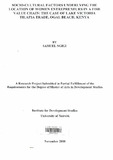Socio-cultural factors underlying the location of women entrepreneurs in a fish value chain: the case of Lake Victoria tilapia trade, Ogal beach, Kenya.
Abstract
Women entrepreneurs playa significant role in promoting development. They own the
majority of businesses in the micro, small, medium scale categories. Women's
entrepreneurial pursuits are impeded by myriad of constraints. These constraints are
structural in nature but hinged on socio-cultural aspects while others are purely cultural
with negative implications on women's entry, mobility and location within a value chain.
A great deal of attention has been paid to economic dynamics which influence the
location and performance of women entrepreneurs in a value chain while little attention
has been paid to socio-cultural factors. The study focused specifically on women
entrepreneurs in tilapia trade at Ogal fishing beach. Our aim is to map the tilapia value
chains, locate women in the chains, establish factors which influence their location in the
tilapia value chains and identify the socio-cultural factors that influence the location of
women in the tilapia value chains.
The study established that culture is not entirely detrimental to women involvement in
entrepreneurship. However, there are several aspects in which social cultural factors
deter or constrain women involvement in entrepreneurship thereby eroding their
competitiveness. Women have less access to formal education, fewer resources of their
own, have less control of their time, income or decisions they make. High dependency
level takes away the time and resources that could be used in enterprise development.
Women also face excessive demand on their time as mothers, wives and managers of
their homes. They face competing demand in relation to domestic commitments and
entrepreneurial pursuits. These socio-cultural constraints hinder their ability and
opportunity to unleash optimally their entrepreneurial potential.
For reversal of these trends, there should be concerted effort to manage changing sociocultural
environment to favour women engagement in entrepreneurship. Adoption of
appropriate technology should be championed as a means of saving time and energy
spent by women in fetching water, firewood and cooking amongst other duties. HIVIAIDS
as a major contributory factor to high dependency level should be treated as a key
development agenda. The government should come up with strategies of relieving the
women the dependency burden. The society should embrace the changing role of women.
There CShould be a mind shift> towards support of women entrepreneurs (socially,
financially and politically). Entrepreneurship training is vital in building the capacity of
women entrepreneurs. Financial institutions should also tailor make credit products that
are friendly to women taking into consideration the unique socio-cultural environments
in which they operate.
All in all, the study advocates for deliberate efforts by all the stakeholders in embracing
gender-balanced and gender-sensitive policies in pursuit of sustainable development
through empowerment of women entrepreneurs.
Citation
A Research Project Submitted in Partial Fulfillment of the Requirements for the Degree of Master of Arts in Development StudiesPublisher
Arts-Development studies

